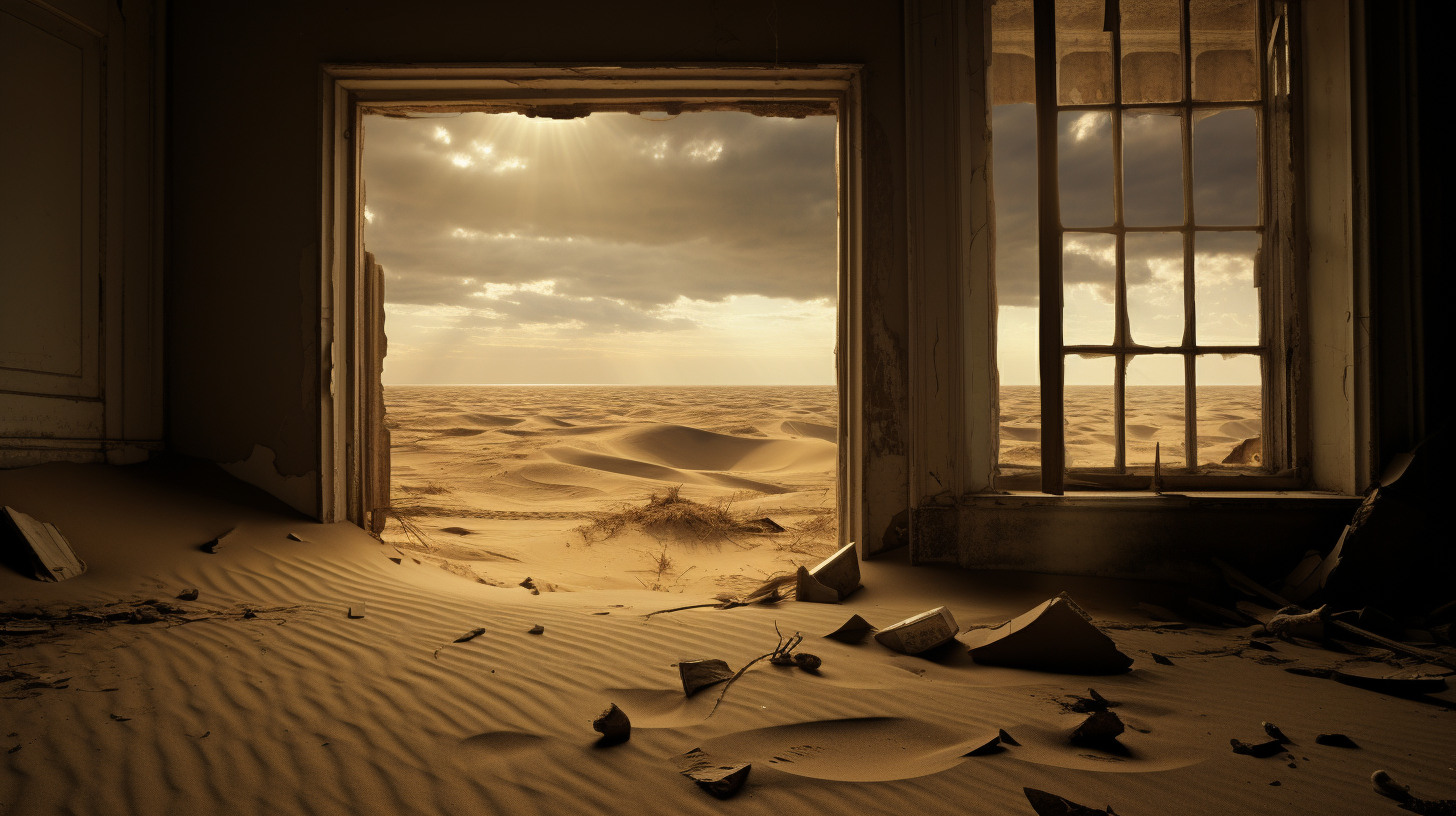Amidst the vast, undulating plains where greenery once thrived, the Whispering Sands stretch as far as the eye can see, barren and desolate. ‘A sea of endless grains, too silent to comprehend,’ goes the saying among the last storytellers of our withered world. What was once a land of prosperity is merely a whisper now, a poignant testament to a lost battle against nature’s wrath that we ignorantly unleashed.
Life once bounded across these fields, the air reverberated with the buzz of insects and the rustle of leaves, but the boundless skies have since turned their back, leaving behind a stark palette of browns and grays. The grains of sand, sharp and biting as they are carried by the remorseless wind, sing a sorrowful dirge for the Mother Earth we so forsakenly stripped bare.
The Whispering Sands are not a mere natural occurrence; they are a monument to human folly, to the ceaseless extraction, the unquenchable thirst for what lay beneath the ground: the water aquifers that once quietly sustained all life, now as devoid as the overlying landscape. The ‘Sole Tenders’ endeavored to salvage the remnants of fertility with their bioengineered seeds, but to pit science against the might of an aggrieved planet was an optimistic gamble at best, and, as the ‘Soil Pirates’ knew too well, a fruitless endeavor in the face of such cataclysmic spoilage.
An eerie stillness pervades these sands, filling the void where laughter and hope once resided. The desiccated remains of ancient trees stand sentinel, skeletal fingers pointing in accusation to skies that no longer nourish. ‘This,’ whispers the sand, ‘is the consequence of your avarice.’ It is a harsh lesson written in the dust – what we have sown, so shall we reap.
In the tapestry of destruction, some threads of the past stubbornly cling on. Faint vestiges of what was once a riverbed cut a meandering path through the bleakness, a cruel mockery of the once bountiful rivers that slaked the earth’s thirst. The rustic husks of machinery, rusted and forlorn, stand as ghostly monuments to an era of technological hubris that promised mastery over nature but delivered only desolation.
In whispers, the ancients speak of a time when the winds carried scents of flora, not the acrid taste of dust, and the horizon danced with vibrant hues, not the monotonous expanse of lifelessness. ‘Remember,’ they implore, though their voices are barely heard above the silent scream of the sands. Remember, lest the folly is repeated in some far-flung future where this cautionary tale is lost to the annals of time.
Yet, amidst the desolation, a strange beauty persists in the ghostly dance of the sands. There is a haunting rhythm to their movement, a reminder that even in the face of unspeakable neglect, the earth continues its eternal, albeit anguished, symphony. The sun still rises and sets, casting elongated shadows that mimic the curves of a time when life was abundant. It is a beauty born of resilience, a stark reminder that some remnants endure even when all seems lost.
The tale of the Whispering Sands is not one of hope, for that time has passed. It is a chronicle of desolation, an elegy for a world we knew and squandered. It stands as an imperative for reflection, not for the world that we inhabit in these pages- for it lies too far gone – but for the one that might still exist beyond, where readers hold the power to heed the whispers and alter the course of an otherwise inevitable fate.
And so, the sands continue to whisper, their voices an amalgamation of past regrets and present sorrow. For the sands remember all, and they speak a tale of warning – one weaved with sorrow and threaded with the grim knowledge of what becomes a world shunned by the very elements that gave it life.
